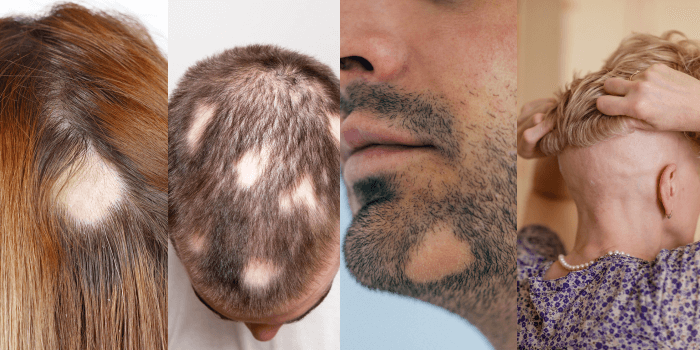Oncology Patient Resources
Cancer.Net is the patient information website of the American Society of Clinical Oncology (ASCO). All patient education content is reviewed and...

Alopecia areata is a dermatologic disorder that can cause hair loss on the scalp and other parts of the body. This autoimmune disorder affects 6.8 million people in the U.S., and it can be challenging to manage, especially if you're unaware of the underlying causes and possible treatments of alopecia areata. Alopecia areata affects 6.8 million people in the United States and has a lifetime risk of 2.1%. This disease affects people of all ages, sexes, and ethnicities.
If you are living with this dermatology condition, you may want to understand how to stop alopecia areata from spreading or progressing. In this blog post, we'll discuss the causes, diagnosis, and effective ways to stop alopecia areata from spreading and control the symptoms. Please consult with your physician for the best treatment course for you.
Although the specific cause of alopecia areata remains unknown, researchers believe that it results from an autoimmune disorder that causes the immune system to attack hair follicles.
Genetics can also contribute to the development of alopecia areata, as studies indicate that the condition runs in family genetics.
Stress and environmental triggers can also cause or worsen the symptoms of alopecia areata, as some may experience hair loss after experiencing physical or emotional stress.
Your dermatologist will examine your hair and scalp to determine how widespread the hair loss is and whether or not you have any other skin conditions that could be contributing to your symptoms. A scalp biopsy may need to be conducted to confirm the dermatologic disorder diagnosis.
In some cases, your dermatologist may need to order blood tests or skin biopsy for skin cancer. If your doctor finds that your hair loss could be attributed to an underlying medical condition (such as a thyroid disorder or lupus), they may refer you to a specialist.
For information on other chronic skin conditions, check out these resources:
There is currently no cure for alopecia areata, but there are several treatments that can help stop the progression of hair loss and promote hair growth. Some of the most commonly used treatments for alopecia areata include topical corticosteroids, injected corticosteroids, and immunotherapy.
Topical corticosteroids come in the form of creams or ointments that are applied directly to the scalp to reduce inflammation and stop hair loss. While injected corticosteroids are delivered directly into bald spots on the scalp.
Topical immunotherapy causes an allergic response on the scalp to prompt hair growth.
While treatment options for alopecia are usually applied to the skin or as an injection, Olumiant is an oral prescription medication that is approved to treat severe alopecia areata. Olumiant is the first oral treatment option fully approved for alopecia areata.
Senderra Specialty Pharmacy offers many immunology therapies for alopecia, which include:
Making some lifestyle changes, such as a healthy diet and reducing stress, can also help manage the symptoms of alopecia areata.
Reducing stress levels can help prevent flare-ups of the condition. Exercise, yoga, meditation, and other relaxation techniques can help manage stress and promote emotional and physical wellbeing.
Eating a balanced diet rich in vitamins and nutrients, such as iron-rich foods like spinach and lean protein sources, can also improve hair health.
Also, avoid using harsh hair styling products that can damage or irritate the scalp, and wear protective head coverings when exposing your hair to the sun or other environmental factors.
Living with alopecia areata can be challenging, but there are ways to cope with the condition. Joining support groups or seeking counseling can help you manage the emotional effects of the disease, and you can also explore techniques to help you cope with hair loss.
Having access to wigs, hair extensions, or other hair coverings can help you feel more confident and comfortable while dealing with alopecia.
The key to stopping alopecia areata from spreading depends on timely diagnosis, effective treatment options, and adopting a healthy lifestyle. If you suspect that you have alopecia areata, we suggest visiting a dermatologist for further evaluation.
Senderra offers specialized treatments for more than 15 specialties including dermatology and autoimmune disorders like Lupus Nephritis, Guillain Barre Syndrome, Sarcoidosis disease, psoriasis, chronic asthma, CRSwNP and rheumatoid arthritis, gastroenterology, immune system disorders, dermatologic diseases, and more.
We put you first.
You deserve to be treated as a person, not a number.
With Senderra, you'll talk with real people who are dedicated to enabling you to get the medications and supporting information you need for your condition.
 Senderra is a national specialty pharmacy, serving patients with challenging and ongoing medical conditions, like autoimmune disorders, through provision of specialty medications, clinical expertise and support services.
Senderra is a national specialty pharmacy, serving patients with challenging and ongoing medical conditions, like autoimmune disorders, through provision of specialty medications, clinical expertise and support services.
We dedicate ourselves to designing and executing a model to serve the needs of our patients and partners (Prescribers, Pharma and Payers) in order to make a difference and effect positive outcomes.
Disclaimer:
No content on this site, regardless of date, should ever be used as a substitute for direct medical advice from your doctor or other qualified clinician.
References:
https://www.nhs.uk/conditions/multiple-sclerosis/
https://www.nationalmssociety.org/What-is-MS

Cancer.Net is the patient information website of the American Society of Clinical Oncology (ASCO). All patient education content is reviewed and...

An estimated 2.4 million people are living with Hepatitis C in the United States. About 4 in 10 people with Hepatitis C do not know they are...

Psoriatic Arthritis (PsA) is a chronic autoimmune disease that affects millions of people worldwide. It's a condition that not only causes joint pain...